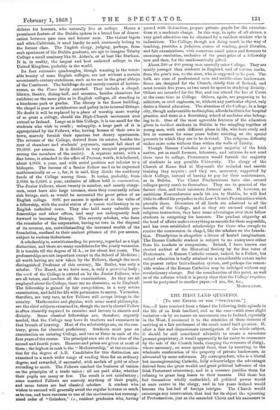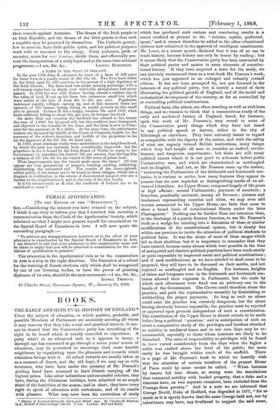THE IRISH LAND QUESTION.
[To THE EDITOR. OF TIIE"SPECTATOR.."] SIR,-I have received from a friend the following little episode in the life of an Irish landlord, and as the case—with some slight variation—is by no means an uncommon one in Ireland, especially in the West, I commend it to the attention of those desirous of arriving at a fair settlement of the much vexed land question. If, after a fair and dispassionate investigation of the whole subject, it should be still considered advisable to create a numerous peasant proprietary, it would apparently be far easier to commence by the sale of the Church lands, charging the revenues of clergy, where necessary, on some special fund, than by resorting to the wholesale confiscation of the property of private landowners, as advocated by some reformers. My correspondent, who is a liberal but uncompromising Catholic, fully acknowledges the advantages derived from the great wealth and great political influence of the Irish Protestant aristocracy, and in a measure justifies them for refusing to grant long leases to their tenants. Did these but feel themselves wholly unshackled, all political power would at once centre in the clergy, and in ten years Ireland. would become the hot-bed of foreign intrigue. The Church would encourage any intervention that had for its object the uprooting of Protestantism, just as she seconded Clovis and his successors in
their crusade against Arianism. The dream of the Irish people is an Irish Republic, and the dream of the Irish priests is that such a republic may be governed by themselves. The Catholic gentry, few in number, have little public spirit, and for political purposes work with or succumb to the clergy. Petty jealousies, pride of ancestry, scorn for novi lomines, divide them, and effectually pre- vent the inauguration of a truly loyal and at the same time national A FARM IN THE WEST OF IRELAND.
In the year 1786 John B. obtained the lease of a farm of 320 acres for three lives at a yearly rental of 381. 10s. Gd. Two lives have fallen in, the third, aged 85, still survives, in the person of a high dignitary of the Irish Church. The farm land was prime grazing pasturage. with a soil twenty-eight feet in depth, over which the ploughshare had never passed. In 1792 the war with France having caused a sudden rise in the value of land, B. cut up his farm into numerous small lots, which were sublet at the rate of from 40s. to 50s. per acre. Population increased rapidly, villages sprang up, and at this moment there are upwards of 350 human beings living in sordid poverty on this small plot of ground. Farmer B. led a happy, careless life until 1818, when rents suddenly falling to about 30s. per acre, he became involved.
On more than one occasion the landlord has offered to his tenant the sum of 1,0001. for his good-will, but the creditors have interposed, and objected to the transfer of the lease, and the farm is now in Chan- cery for the payment of B.'s debts. At the same time, the unfortunate tenants are harassed by bailiffs of the Court of Chancery, bailiffs for the recovery of the widow's furniture, and bailiffs of the proprietor in fee for the payment of the 381. 10s. Gd. head rent.
In 1850, great drainage works were undertaken in the neighbourhood, by which the land has certainly been considerably improved; but the proprietor in fee is bound by the Irish Board of Works to repay to the Government in consideration thereof 221. per annum, thus leaving him a balance of 161. 108. Gd. for the rental of 320 acres of prime land.
What improvements has the tenant made upon the farm? All that appear are four generations of paupers, burning, racking, subletting, resubletting, the exhausted soil. The results of the short-sighted, selfish policy of the tenant are to be found in these villages, which are a disgrace to civilization, in the swarm of discontented paupers who are a burden to the neighbourhood, and in the ruin of his own family.
Is it for tenants such as B. that the landlords of Ireland are to be sacrificed en masse ?



































 Previous page
Previous page